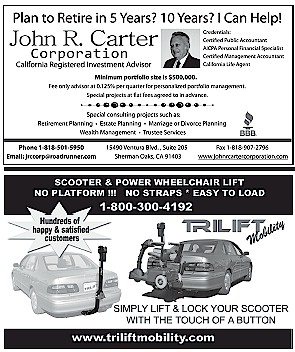
|
 
 
by Margaret Heine
QUESTIONS FROM OUR READERS
I want to leave my property to my
children, but I have a reverse mortgage,
can I still put my home in a trust?
A reverse mortgage is a loan against
your property. Simply, it is repaid by your
heirs when you pass on instead of monthly
payments now. The interest rate is
structured higher than a conventional
mortgage. If your property has enough
equity, then the added value of the
property belongs to your heirs. Your
property can still be held in trust, but your
heirs need to understand that the reverse
mortgage must be paid off upon your
passing. This can be accomplished in
many ways, including trust provisions that
the property be sold or having a life
insurance policy that provides enough
money to pay off the loan.
I am thinking of pursuing a loan
modification, should I pay someone to
help me?
The law in California now prohibits
attorneys or mortgage agents from
collecting any upfront fees for loan
modifications. That is good news. You do
not have to pay for services until the
service is actually rendered. In reality, the
law is set up so that everyone can handle a
loan modification on their own, if they
choose. You will typically need to fill out
an application, provide a financial
statement, and show that you qualify for
the loan modification. Loan modifications
can be of many different types ranging
from a change in your interest for a fixed
period of time or the life of the loan,
forgiveness of some of the debt, an
extended period in which to repay the
loan, as well as many other variations. The
objective of the law is to keep homeowners
in their home. So, don’t expect the bank to
take a $200,000 or $300,000 loss on your
property. Expect a more affordable house
payment with radically reduced interest
rates for the next five years.
What is a Homestead Exemption?
A homestead exemption allows a
homeowner to exempt some of the equity
in their home from creditors. If you file a
Homestead Declaration your creditors will
normally not be able to attach all of the
equity in your home. In 2010, the
exemption amounts will be $75,000 for an
individual, $100,000 for a married couple,
and $175,000 for persons over 75 years old.
Are there any new tax credits for 2010?
There are two credits of particular
interest. New Home Credit. A new home
purchase tax credit is available for people
who purchase a new construction home –
one that has never been lived in. They will
be eligible for a tax credit of the lesser of
5% of the purchase price or $10,000.00
against their California income. The credit
is taken over three consecutive years for
purchases made after March 1, 2009 and
before March 1, 2010.
Hiring Tax Credit. Small businesses of
less than 20 employees can benefit from a
hiring tax credit in the amount of $3,000.00
for each full time employee which was
hired after January 1, 2009. The credit is
available for a business that has increased
the total number of employees employed.
This credit is limited, so, it is only
available as long as funds are available.
I am planning on having some
remodeling work done and I am thinking
of saving some money by hiring an
unlicensed contractor, what should I
know?
First, if you hire an unlicensed
contractor for any job over $500.00, and
they get hurt working on your property,
you will be liable for their injuries. You
will be considered the “employer” of the
unlicensed workers.
Second, unlicensed contractors are not
supposed to be doing work they are
required to have a license for and don’t.
The law in 2010 gets much tougher with
big penalties for the unlicensed worker for
jobs over $600.00. If the person doing the
work is unlicensed, they may not sue to
collect any money owed to them. The law
changes in 2010 to also add that the
unlicensed person will have to pay back all
of the money they received for the job.
The State believes that this will protect
homeowners from poor workmanship and
scams. This is very bad news for the small
mason, carpenter, electrician, or plumber
looking to make a few extra dollars if they
are unlicensed.
Licensed contractors must post bonds.
Always check to see that they are insured
and have worker’s compensation
insurance.
Margaret A.M. Heine is the principal
counsel at Heine Law Group in
Fullerton, California. She is licensed in
California and Washington, and has
authority to practice before the Supreme
Court of the United States and the
United States Court of International
Trade. Her practice includes estate
planning, wills, trusts, and probate as
well as business, real estate, and civil
litigation.
For more
information, visit her website at
margaretamheine.com.
|
|